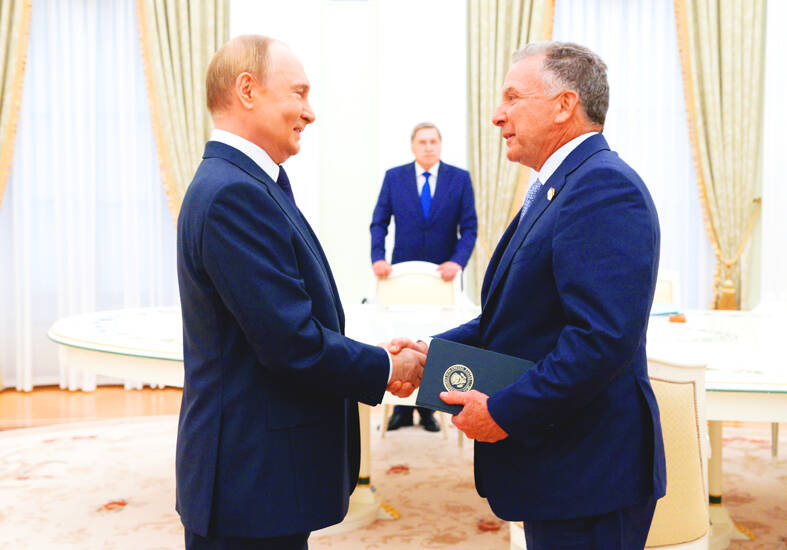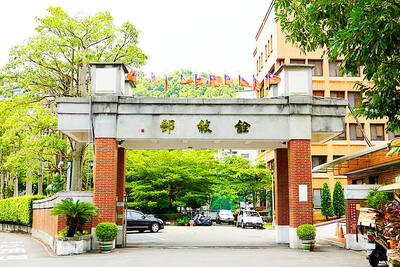Russian President Vladimir Putin held talks with US President Donald Trump’s special envoy Steve Witkoff in Moscow yesterday, the Kremlin said, days before the White House’s deadline for Russia to reach a peace deal with Ukraine or potentially face severe economic penalties that could also hit countries buying its oil.
The Kremlin did not immediately provide more details of the meeting.
Earlier, Witkoff took an early-morning stroll through Zaryadye Park, near the Kremlin in Moscow, with Kirill Dmitriev, the Russian president’s envoy for investment and economic cooperation, footage aired by TASS showed.

Photo: EPA / Gavriil Grigorov / Sputnik / Kremlin Pool
Dmitriev played a key role in three rounds of direct talks between delegations from Russia and Ukraine in Istanbul, Turkey, in the past few months, as well as discussions between Russian and US officials.
Trump’s deadline for Putin ends tomorrow. Washington has threatened “severe tariffs” and other economic penalties if the war does not stop.
Trump has expressed increasing frustration with Putin over Russia’s escalating strikes on civilian areas of Ukraine.
Overnight from Tuesday to yesterday, Russian forces hit a recreational center in Ukraine’s southern Zaporizhzhia region, killing two people and injuring 12, including two children, Zaporizhzhia Governor Ivan Fedorov said yesterday.
On Tuesday, Trump said “we’ll see what happens” regarding his threat to slap tariffs on nations that buy Russian oil, which could increase import taxes dramatically on China and India.
“We have a meeting with Russia tomorrow,” Trump said. “We’re going to see what happens. We’ll make that determination at that time.”

Taiwan Semiconductor Manufacturing Co (TSMC, 台積電) is expected to start construction of its 1.4-nanometer chip manufacturing facilities at the Central Taiwan Science Park (CTSP, 中部科學園區) as early as October, the Chinese-language Liberty Times (the Taipei Times’ sister newspaper) reported yesterday, citing the park administration. TSMC acquired land for the second phase of the park’s expansion in Taichung in June. Large cement, construction and facility engineering companies in central Taiwan have reportedly been receiving bids for TSMC-related projects, the report said. Supply-chain firms estimated that the business opportunities for engineering, equipment and materials supply, and back-end packaging and testing could reach as high as

CHAMPIONS: President Lai congratulated the players’ outstanding performance, cheering them for marking a new milestone in the nation’s baseball history Taiwan on Sunday won their first Little League Baseball World Series (LLBWS) title in 29 years, as Taipei’s Dong Yuan Elementary School defeated a team from Las Vegas 7-0 in the championship game in South Williamsport, Pennsylvania. It was Taiwan’s first championship in the annual tournament since 1996, ending a nearly three-decade drought. “It has been a very long time ... and we finally made it,” Taiwan manager Lai Min-nan (賴敏男) said after the game. Lai said he last managed a Dong Yuan team in at the South Williamsport in 2015, when they were eliminated after four games. “There is

Democratic nations should refrain from attending China’s upcoming large-scale military parade, which Beijing could use to sow discord among democracies, Mainland Affairs Council Deputy Minister Shen You-chung (沈有忠) said. China is scheduled to stage the parade on Wednesday next week to mark the 80th anniversary of Japan’s surrender in World War II. The event is expected to mobilize tens of thousands of participants and prominently showcase China’s military hardware. Speaking at a symposium in Taichung on Thursday, Shen said that Chinese Minister of Foreign Affairs Wang Yi (王毅) recently met with Indian Prime Minister Narendra Modi during a visit to New Delhi.

FINANCES: The KMT plan to halt pension cuts could bankrupt the pension fund years earlier, undermining intergenerational fairness, a Ministry of Civil Service report said The Chinese Nationalist Party (KMT) caucus’ proposal to amend the law to halt pension cuts for civil servants, teachers and military personnel could accelerate the depletion of the Public Service Pension Fund by four to five years, a Ministry of Civil Service report said. Legislative Speaker Han Kuo-yu (韓國瑜) on Aug. 14 said that the Act Governing Civil Servants’ Retirement, Discharge and Pensions (公務人員退休資遣撫卹法) should be amended, adding that changes could begin as soon as after Saturday’s recall and referendum. In a written report to the Legislative Yuan, the ministry said that the fund already faces a severe imbalance between revenue